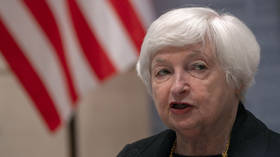Germany adopts first-ever China strategy
The German government has for the first time revealed a “Strategy on China,” with a focus on reducing trade reliance on its largest economic partner, which Berlin views as a “systemic rival.”
The paper, published on Thursday on the Foreign Office webpage, states that China has changed, and Germany needs to adapt its approach as a result. Having achieved strong economic growth over the past few decades, Beijing is now pursuing an economic policy that “aims to make it less dependent on other countries, while trying to make others more dependent on China,” the document says.
While Germany is not seeking to decouple itself from Beijing, “de-risking is urgently needed,” the 40-page English-language version of the strategy states.
The document cites the example of Germany’s prior dependence on Russia as its main supplier of energy, and the need to avoid such a situation arising with other countries in areas that are critical to the energy transition or technological innovation.
“It is a priority for us to reduce such risks swiftly and at a cost that is acceptable to the German economy,” the paper states.
According to the document, Germany depends on China in numerous areas, including various metals and rare-earth elements, medical technology and pharmaceuticals, as well as for information technology and products needed to manufacture semiconductors.
Germany aims to expand its own technological capacity and diversify supply chains. The strategy describes “de-risking” as “an expedient supplement to our actual strength, namely the openness of our political, economic and social system.”
China is Germany’s largest trading partner, with bilateral trade reaching a record €300 billion ($337 billion) last year.
The strategy describes China as “simultaneously a partner, competitor and systemic rival.” Despite its concerns, Berlin plans to further strengthen cooperation with China, which remains an “indispensable partner” in areas including climate change mitigation, food security and resolving debt crises internationally.
For more stories on economy & finance visit RT’s business section
You can share this story on social media:








Comments are closed.